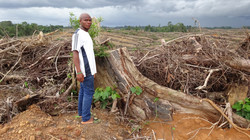Milieudefensie | 8 April 2022
ING withdraws from complaint against the bank’s involvement in the palm oil sector
April 7 2022, Amsterdam, Jakarta, Monrovia - Today, the Dutch National Contact Point (NCP) for the Organization of Economic Co-operation and Development (OECD) published the final statement on the complaint from Friends of the Earth groups and supporters against ING bank. The complaint was supposed to deal with adverse impacts of three of the bank’s palm oil clients, ranging from human rights and labour rights violations todeforestation. ING withdrew from the complaint, leaving the communities affected by the oil palm plantations empty handed.
In 2019, WALHI (Friends of the Earth Indonesia), SDI (Friends of the Earth Liberia) and Milieudefensie (Friends of the Earth Netherlands) filed a complaint with the Dutch NCP. The civil society groups asked the NCP to clarify the conditions under which ING can be held responsible for the actions of companies they are connected to, the impact of their abuses and how ING should contribute to remedies. The final statement does not clarify any of the issues raised because ING backed out of the process and the NCP decided not to conduct its own examination.
The complaint substantiates that ING has been financing the three controversial palm oil companies for decades: Noble group destroyed massive areas of tropical rainforest in Indonesia, Socfin/Bolloré is related to land rights and other human rights violations in West Africa and Wilmar engaged in labour rights violations including child labour in Liberia and Indonesia. These adverse impacts were recognized and not up for debate during the process. Milieudefensie and partners demand that ING contributes toredress, and withdraws from these companies and from the industrial palm oil sector as a whole.
Wouter Kolk, campaign leader at Milieudefensie: “The unilateral withdrawal from ING is outrageous. The bank just steps back and leaves the mediation, without any consequences. This means that ING continues to profit from its client‘s deforestation, child labour and human rights violations.“ ING says it withdrew from the process because it does not trust Milieudefensie, after a publication about the failure of RSPO certification process and an article written by a Dutch newspapers about its clients misconduct. “Rather than solving the critical issues raised in the publications, ING bank chooses to walk away from its responsibilities while it has financed these controversial palm oil companies for decades.“ The OECD complaints system provides for a voluntary mediation process. The NCP has the tools and power to prevent this unilateral withdrawal and examine ING ‘s misconduct, but chose not to. This shows the weakness in our current systems and strengthens our calls for binding regulation for the financial sector that provides access to justice.
The palm oil companies financed by ING are often RSPO members or RSPO certified. However, they still cause severe social and environmental damage. Uli Arta Siagian, forest campaigner from WALHI says “The oil palm plantations, whether they are certified or not, lead to deforestation, peat and forest fires, water crisis, massive CO2 emissions, and related health and climate impacts all over the world. The companies structurally engage in child labour, human rights violations, and land grabbing. There are cases of sexual assaults against women workers. This clearly shows that the financial sector cannot rely on voluntary certification schemes to assess their clients.”
James Otto from SDI: “We now call on the Dutch NCP to ensure justice and redress and do everything in their power to protect the rights of people and prevent further forest destruction by oil palm companies. We will continue to work with local communities to identify other ways to hold ING bank and other financiers to account. They can walk away from the table but not from having to face the responsibility of their clients misconduct.“
Notes:
- NCP final statement
- OECD Watch webpage on the complaint
- Milieudefensie’s press release (20 January 2020) “Friends of the Earth groups complaint against ING admissible, declares OECD”
- OECD Guide for National Contact Points on Confidentiality and Campaigning when handling Specific Instances
- Milieudefensie report: Palm Oil Certification, Not out of the woods
- The OECD complaint was supported by several other international organizations including DEC, ReAct Transnational, FIAN Belgium, HEKS (former Bread for all), FERN and CNCD-11.11.11.














